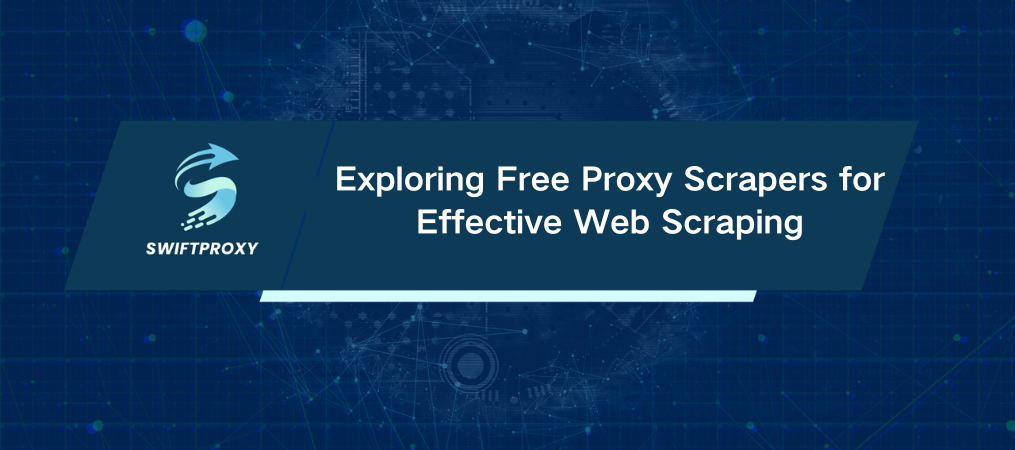Exploring Free Proxy Scrapers for Effective Web Scraping

Web scraping is a powerful tool that drives insights and innovation across industries. Studies indicate that 75% of companies leverage web scraping for competitive analysis and data gathering. This practice hinges on using proxies, essential for masking your IP address and navigating the web without raising alarms. This guide will explore the concept of proxy scrapers, specifically focusing on free options. What are they? What can they do? Let's uncover the benefits and limitations, empowering you to scrape smarter.
Introduction to Proxy Scraper
A proxy scraper is software designed to collect and manage proxy servers. Think of it as your digital cloak, allowing you to browse the web without revealing your identity. By routing your internet traffic through a proxy, you can hide your real IP address. This makes it difficult for websites to track your activity or block your requests. The potential applications are vast, including web scraping, data mining, and bypassing geo-restrictions.
How Proxy Scrapers Function
The mechanics of a proxy scraper are straightforward:
Scraping: The scraper scours the internet for publicly available proxy servers, collecting key details like IP addresses, ports, locations, and anonymity levels.
Confirmation: After gathering a pool of potential proxies, it checks their functionality by sending requests to confirm they are active and responsive.
Screening: Verified proxies are filtered based on speed, location, and anonymity. The result is a curated list tailored to your needs.
Refreshing: Many scrapers continuously refresh their lists, ensuring access to the latest and most reliable proxies.
Why Proxy Scrapers Are Beneficial
The advantages of using a proxy scraper are significant:
Access to Various IPs: A vast array of IPs helps you dodge IP bans and scrape data from various websites without triggering security measures.
Stay Anonymous: Maintain your privacy while collecting data. This is crucial for handling sensitive information or evading detection.
Bypassing Location Limits: Proxies allow access to content restricted in your area by simulating different geographical locations.
Enhanced Speed and Performance: Distributing requests across multiple proxies enables faster and more effective data collection.
Budget-Friendly: Free proxy scrapers provide an economical solution for individuals and businesses seeking proxies without financial commitment.
Free Proxy Scrapers
Free proxy scrapers are valuable tools that grant access to proxy servers without costs. However, these benefits come with certain trade-offs.
Benefits of Free Proxy Scrapers
No Cost Involved: They are free, making them accessible for everyone, particularly those on tight budgets.
Convenience: Many come with intuitive interfaces, allowing those with minimal tech skills to navigate them easily.
Community Assistance: Many free tools have active online communities that provide shared knowledge and troubleshooting assistance.
Diverse Proxy Options: Free proxy scrapers often provide a diverse range of proxies, giving you options to suit your specific needs.
Drawbacks of Free Proxy Scrapers
Reliability and Standards: Free proxies can be inconsistent, with issues like slow speeds and frequent downtime.
Safety Concerns: Free proxies may log your data or expose you to malicious activities. Caution is necessary.
Few Functions: Many lack advanced options that paid services offer, such as automated updates or dedicated customer support.
IP Blocks: The risk of bans increases with many users sharing free proxies, potentially wasting your time and effort.
Ethical Aspects : The origins of free proxies can sometimes be questionable. It's vital to consider the legality and ethics of your scraping activities.
Well-Known Free Proxy Scrapers
Several free proxy scrapers are worth exploring:
ProxyScrape: A reliable option that provides a collection of proxies that can be filtered by type and status.
GatherProxy: It lists free proxies and allows you to test their speed and reliability, making it ideal for beginners.
Spys.one: A comprehensive option that provides extensive information on proxies, including speed and uptime.
Free Proxy List: This tool offers quick access to free proxies along with essential details like location and anonymity levels.
ScraperAPI: A robust tool that eases the scraping process by managing IP bans and CAPTCHAs. Its limited free tier is suitable for small projects.
Getting the Most Out of Your Proxy Scraper
To maximize your proxy scraper's potential, consider these best practices:
Select the Right Scraper: Match your needs to the scraper. If you require high-quality proxies, consider a paid service. For casual use, free options may suffice.
Keep Your Proxy List Updated: Proxies can disappear quickly. Keep your list fresh to maintain reliability.
Validate Proxies Before Use: Always check a proxy's speed and reliability before relying on it. Built-in testing features can save you time.
Switch Proxies: Frequently changing your proxies minimizes the risk of detection. This helps you stay under the radar.
Adhere to Legal Standards: Respect the terms of service of the websites you scrape. Understanding legal implications is crucial for avoiding issues.
Conclusion
Free proxy scrapers are invaluable for anyone looking to collect data while maintaining privacy. They provide essential benefits like cost-effectiveness and user-friendliness, but they also have drawbacks like reliability and security risks. By understanding these aspects and implementing best practices, you can effectively use these tools for your web scraping projects. Mastering the use of proxy scrapers can significantly enhance your data collection efforts.

















































